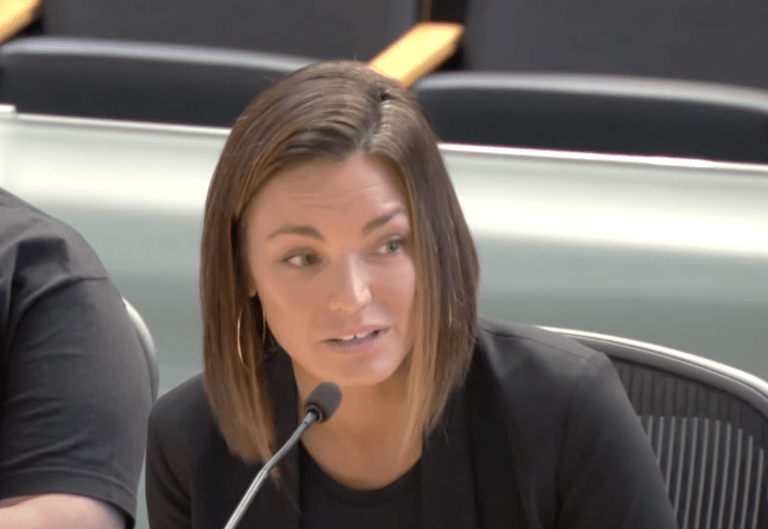The More We Love Launches Six-Month "High Accountability" Out-of-Town Shelter for Commercially Exploited Women
Departing City Councilmember Cathy Moore secured funding for the group, bypassing a competitive bidding process that was already underway.

By Erica C. Barnett
The More We Love, a group that began as a private homeless encampment sweep contractor, just finalized its contract with the city to provide 10 shelter beds for the rest of the year, at a cost of around $600,000, to women seeking to leave the sex trade on Aurora Ave. N. The organization already operates a 20-bed shelter for sexually exploited women and their children in Renton, and plans to add 10 new "non-congregate" shelter spots, which appear to consist of rooms at a hotel that also serves the general public.
During a Seattle City council meeting last month, the group's founder, Kristine Moreland, brought several of her clients to provide sometimes graphic testimony about their experiences as victims of commercial sexual exploitation. Stories like theirs appear to have swayed former (as of today) city councilmember Cathy Moore to direct up to $1 million in city funding to the group earlier this year, forestalling a competitive bidding process that was already underway.
The contract contains a number of provisions and deliverables that are unusual for a city human services contract.
For example, it says The More We Love's program is "intentionally low barrier to enter and has high accountability to stay." What this means, according to the contract, is that women with substance use disorders "are asked to commit to a pathway towards recovery to stay in the shelter unit" after what the contract calls a 72-hour "recharge" phase. The maximum stay is 30 days.
"TMWL’s pathway to recovery is connecting the survivor to the appropriate detox/treatment facility, supporting them in the programming that will best fit their needs, and supporting with after care such as TMWL’s recovery housing units," the contract says. "If survivors are not able to commit to the program, TMWL will work with them to find next steps after exiting the emergency shelter."
Requiring commercial sexual exploitation (CSE) survivors to commit to sobriety as a condition of shelter for themselves and their children is not considered a best practice by experts on gender-based violence. "This approach has already been asked and answered as not effective to the realities of substance use and healing from long term trauma," Amarinthia Torres, the co-director of the Coalition Ending Gender-Based Violence, said.
The city's contract with the only other organization it funds to provide shelter beds to women leaving sex work, Real Escape from the Sex Trade, describes REST's program as low-barrier and does not include any "accountability" requirements for participants.
Peter Anderson, The More We Love's chief operating officer, told PubliCola the term "high accountability" means that "we walk alongside women to support their goals, address behaviors that jeopardize their safety or the safety of others, and create environments conducive to recovery and transformation. No woman is ever 'kicked out' for relapse. We meet each individual where they are, while ensuring that program safety standards are upheld for all participants."
The contract goals include 180 referrals to The More We Love's shelter and 105 successful enrollments over six months, which works out to 30 referrals and 17 placements in The More We Love's 10 new beds every month—a swift turnover rate, even with the 30-day maximum stay.
A third and final goal is for all 105 of those women to "report increased safety, agency, dignity, belonging." It's unclear whether or how the city plans to verify that The More We Love has achieved this vague program goal.
In the contract, The More We Love says the group's "ability to merge the public and private sectors to meet the full scope of need makes its program unique. TMWL works closely with the Seattle Police Department (SPD) and regional service partners, like Organization for Prostitution Survivors (OPS), to receive referrals to the emergency shelter, while leveraging a strong network of community volunteers and faith-based supporters to provide relational care beyond what most programs can offer."
A representative from OPS said that contrary to what the contract implies, the group has no formal partnership with The More We Love, although they have occasionally referred women to their shelter on a one-off, strictly "informal" basis.
It's unclear how The More We Love recruits its "community volunteers and faith-based supporters" or how these individuals are trained to provide "relational care." The city requires all volunteers for contractors that work with CSE survivors to complete 20 hours of training prior to volunteering.
The six-month contract includes $23,000 in "automotive" expenses, on top of $5,782 for "client transportation." Asked if The More We Love is using the $23,000 to buy a car, Anderson said, "The automotive budget line covers transportation-related expenses, which may include maintenance, mileage reimbursements, other transportation arrangements, or the acquisition of an additional program vehicle to safely transport women and their children to critical appointments and services."
In comparison, REST's contract for 2025 includes transportation costs of $786.
The More We Love's six-month contract also includes $272,000 for salaries and benefits, along with $10,000 for "consultant services." Client assistance—flexible funds that can be used to help women and their children with expenses, including rent assistance, clothing, job training, child care, and anything else that helps promote self-determination—amounts to $20,000 over the life of the contract. "24/7 onsite security" will cost another $34,000.





I have no confidence whatsoever in The More We Love It is closely connected to Andrea Suarez, who pretends to help unhoused people.
And now-ex CM Moore just keeps on giving . . . leaving the City to deal with her actions.